Trademark refusals, registrations and the war in Ukraine
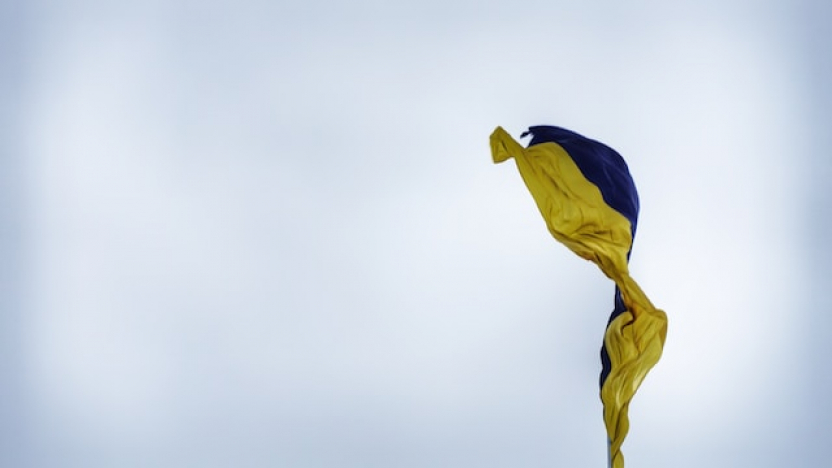
More than 18 months after Russia invaded Ukraine, the war continues to ravage the region. Marion Mercadier considers the situation from a trademark law perspective by examining related trademark refusals and registrations.
First of all, it should be clarified that the Ukrainian IP Office continues to operate full-time, while also providing humanitarian aid and assistance to its employees and those in need. As Director General Andrew Kudin stated in its 1 March 2022 press release:
“We would like to inform you that during this extremely difficult time for the country, during the military aggression of the Russian Federation against Ukraine, which became the reason for the imposition of martial law [...], Ukrpatent continues to operate on a full-time basis providing all the necessary functions and continuous operation of the state system of legal protection of intellectual property [...] We condemn the aggression of the Russian Federation against our country and as the Armed Forces of Ukraine defend the independence, sovereignty and territorial integrity of our country, Ukrpatent, for its part, does everything to protect the country in the field of intellectual property being a competitive institution for the world”.
In addition to the letters of support sent to Ukrpatent, several IP offices have implemented exceptional measures such as extensions of official deadlines for Ukrainian trademark owners. The EUIPO has also extended the SME Fund to enable Ukrainian businesses and individuals to benefit from it, as well as sending humanitarian packages.
Official deadlines are suspended until the end of martial law, which was most recently extended to 15 November 2023.
What do the latest filing numbers tell us?
The Ukrainian IP Office indicates that it intends to continue its activity to ensure the protection of IP rights, despite ongoing challenges. In its latest activity report (4 September 2023), the office reports an increase in 51.2% of IP rights filings during the first half of 2023 compared to the first half of 2022, with performances close to their activity before the war.
The Federal Service for Intellectual Property in Russia (Rospatent) is also operating normally, and we have not observed the implementation of exceptional measures.
The rise of trademark applications related to the war in Ukraine
As with every important event, the situation in Ukraine has led to a rise in related trademark applications. Among the trademarks filed in support of Ukraine are the following signs of note:
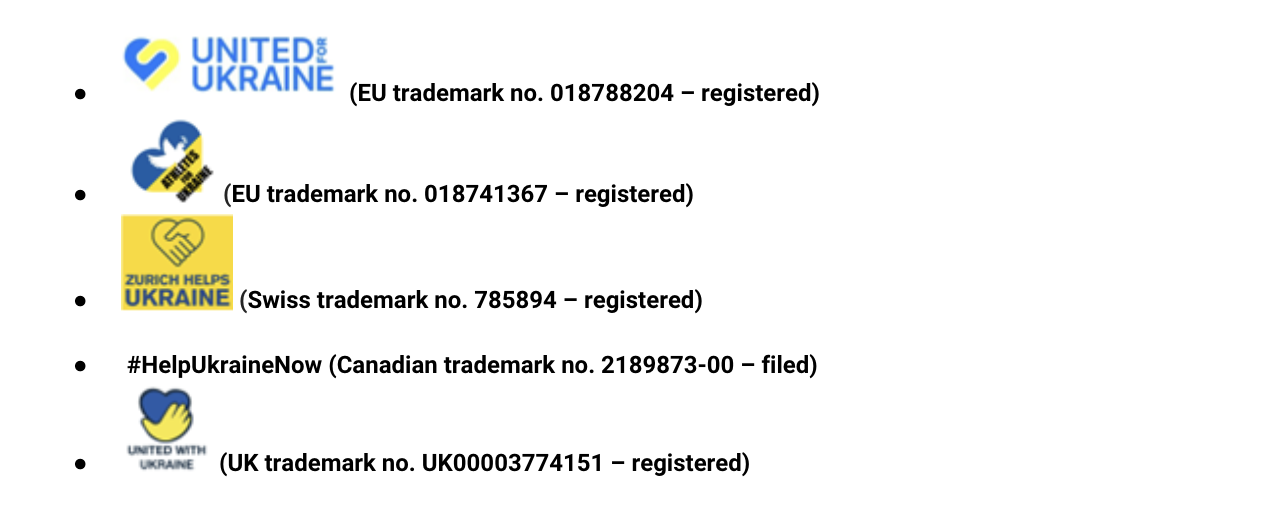
Other trademark applications have been refused, for example:
- BE BRAVE LIKE UKRAINE (US trademark no. 97498168 – refused)
- I HELP UKRAINE (Portuguese trademark no. 2 682335 – refused)
However, we have also noted the filing of some trademarks which are, to say the least surprising. For example, representations of Russian and Ukrainian presidents:
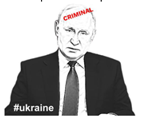
(EU trademark no. 018664926 – filed)
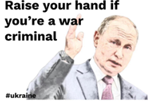
(EU trademark no. 018666817 – filed)
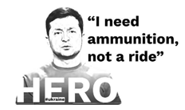
(EU trademark no. EU No. 018666857 – filed)
Similarly, the American word mark I DONT NEED A RIDE I NEED GUNS & AMMUNITION (US trademark no. 97297547) was recently accepted and published for opposition in class 40 (imprinting of messaging on apparel and mugs).
Trademark refusals for lack of distinctive character and morality reasons
When examining the refusals, it can be seen that IP offices are refusing some of these new trademark applications on the basis of lack of distinctive character or infringement of public order/morality. This is in line with the position we have seen in France for the ‘Je suis Charlie’ trademarks, for example. Among these trademark refusals, we can see:
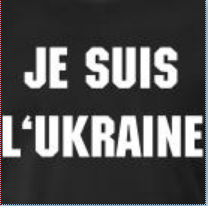
(German trademark no. 3020222094006A – refused for lack of distinctive character)

(EU trademark no. 018672791 filed by the State Border Guard Service of Ukraine – refused for being contrary to public order and morality)
The EUIPO issued an interesting justification for this last trademark refusal based on the political context, explaining:
“The relevant public would perceive the sign as contrary to accepted principles of morality as it seeks to gain financial gain from what is universally accepted to be a tragic event, namely the invasion of Ukraine by the Russian Federation [...] the sign was the last communication made during the February 2022 Russian attack on Snake Island in Ukraine's territorial waters, which cannot be considered an event for promoting the sales of goods and services.
“The implications of the war in Ukraine for the EU extend to inflation, Liquefied Natural Gas (LNG) imports (affecting energy and transport), increase in defense expenditure, refugees’ influx from Ukraine across Europe, shortage of raw materials and negative impact on emerging and developing countries. In addition, it is common knowledge that the war has resulted in the death of thousands of soldiers and in thousands of civilian casualties”.
An appeal was filed against the refusal decision.
These same arguments were taken up by the EUIPO in its decision to refuse the trademark PUT PUTIN IN (n°018843822), which can be translated as ‘put Putin in jail’.
The emergence of “Zelensky” and “Putin” case law?
The EU brand Zelenskyo's (n°018819727) designating in particular cereal-based products in class 30 was also refused as being contrary to morality.
In its decision, the EUIPO indicated that the relevant EU public will understand that this sign refers to Ukrainian President Volodymyr Zelensky and that the mark could be perceived as profiting financially from a tragic event:
“The fact that the mark has been written as ‘Zelenskyo’s’ is not sufficient to remove the immediate link between the mark and the Ukrainian president that has become the face of the victims in the Ukraine War. The Office notes that the name of the Ukrainian President is intrinsically linked to the war taking place in Ukraine. […] The relevant public throughout the European Union would perceive the sign ‘Zelenskyo's’ as contrary to accepted principles of morality as it is a banal use of a term with a highly positive connotation and the mark seeks to gain financial gain from what is universally accepted to be a tragic event (Ukrainian war).”
This type of “Zelensky” case law can also be seen in similar decisions taken by other IP offices, such as the UK and Germany which respectively refused the ZELENSKYY trademarks (UK trademark no. W00000001723874) and ZELENSKY VODKA (German trademark no. 3020220067532) for lack of distinctive character.
At the same time, the US trademark application for F... PUTIN (no. 97287065) for vodka in class 33 was refused for lack of distinctive character, with the USPTO explaining: “This term or phrase is a commonly used message to convey disdain for Vladimir Putin. Because consumers are accustomed to seeing this term or phrase used in ordinary language by many different sources, they would not perceive it as a mark identifying the source of applicant’s goods and/or services but rather as only conveying an informational message.”
A US trademark for PUNCH PUTIN (no. 97301603) is currently under examination.
Other (less offensive) messages of support have also been refused. For example, the following sign was refused by the Estonian, Moldovan and German IP offices for lack of distinctive character and as referring to the war:
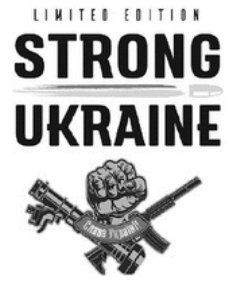
The German Patent and Trade Mark Office explained: “The trademark glorifying the ongoing Russo-Ukrainian War with its countless victims and the endless suffering is contrary to accepted principles of morality/is contrary to public policy.”
Similarly, the Estonian Patent Office said: “Considering the figurative elements and the trademark as whole the mark can be associated with war and with the related and ongoing tragic events in Ukraine, [it] is not suitable to be used for commercial and business purposes."
What can we learn from these trademark refusals?
Of course, it is understandable to see that IP offices are refusing trademarks registered in the context of the war in Ukraine for lack of distinctiveness and/or violation of public order and good morals. However, we note in these decisions a political aspect and position, which is a rather unusual element in decisions relating to trademark law.
The refusals also provide the opportunity to recall two important conditions for trademark validity, namely:
- your chosen sign must be considered distinctive; and
- your chosen mark must not fall foul of rules related to public order and morality. As we have covered here, this criterion can be applied in many situations.
To find out more about this topic or for tailored advice on trademark and branding projects in all your markets of interest, including in Ukraine, get in touch with your Novagraaf attorney or contact us.
Marion Mercadier is a Trademark Attorney based at Novagraaf in Paris.